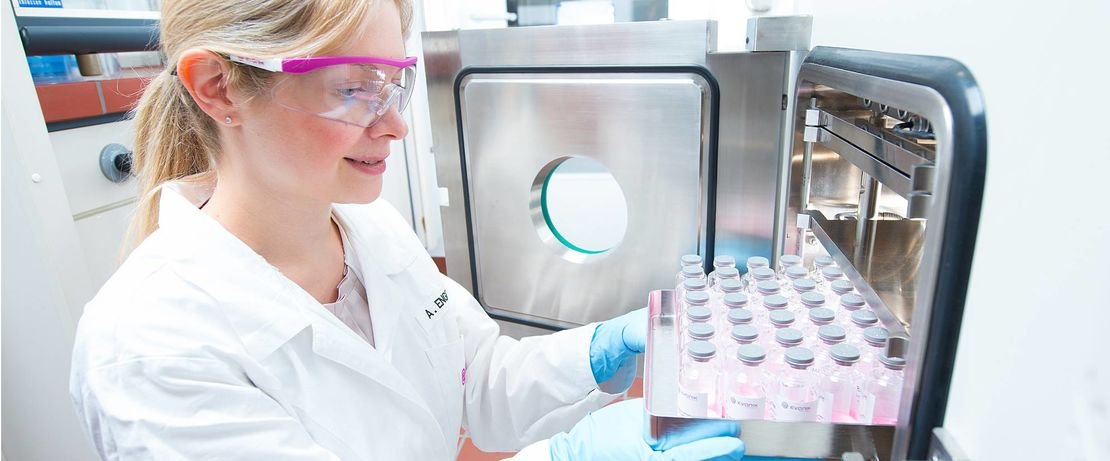Seizing the opportunities from disruptive forces in biopharma
15 July 2021 | Thursday | Opinion

Source : Evonik
Three key disruptive trends are challenging expectations and re-writing the rules of biopharma. Evonik is not only capitalizing on these opportunities, but also quietly driving these trends as an innovation hub at the heart of the pharmaceutical industry.
The market for biological drugs continues to grow at an impressive pace over the past years. Analysts tracking the rise of the biopharma industry spotted its astonishing trajectory well before COVID-19. The biopharma sector generates annual global revenues in the region of $300 billion, representing more than 25% of the total pharmaceutical market.1,2 The annual growth rate of biopharma has consistently exceeded that of conventional pharmaceuticals.
Since biopharmaceuticals are drugs produced in living systems, the rise of biopharma provides the basis for an equally impressive market development for cell culture products. The global cell culture market is expected to reach $42.9 billion by 2026 with a compound annual growth rate of 11.8% from 2016 to 2020.3
WHEN A CRISIS CREATES MOMENTUM FOR CHANGE
While the growth of biopharma was already impressive, the advent of COVID-19 vaccines and antibody therapies have brought the power and potential of biological drugs into the worldwide spotlight. Leading business analysts recognise COVID-19 as a major influencer for the future development of the biopharmaceutical industry.4,5 The pandemic has stimulated a colossal acceleration in the pace of medical innovation, and that raises high expectations. The sequencing of the COVID-19 genome in a matter of weeks and vaccines rolled out in less than a year mean that traditional timelines and approaches are now challenged.
THREE KEY TRENDS WILL UNDERPIN THE SUSTAINABLE GROWTH OF BIOPHARMA BEYOND COVID-19
1. INDUSTRY ATTENTION ON NEW INDICATIONS FOR LARGE MOLECULES
Drug repurposing is a time-saving and cost-effective strategy versus de novo drug discovery. The same is true for the repurposing of technology. When the fight against COVID-19 required a fast response, the industry tapped into its experience with cell culture processes, often initially developed for other indications. For example, viral vector vaccines, made in human cell culture, were already used for Ebola.7
With preventive COVID-19 vaccines already hailed as a success, the race continues to add drugs to the arsenal that can treat patients infected with the disease.8 Monoclonal antibodies (mAbs) produced by cell culture have enabled significant advances in the treatment of cancer and inflammatory diseases in the last decades. As treatments for cancer and COVID-19 often have similar targets in inflammation, cell division and the host microenvironment, this class of biological drugs is also of great interest here.9 The highly advanced cell culture technologies used to produce antibodies were rapidly and successfully used to develop, produce and apply antibodies for the treatment of COVID-19.5,10 First results are promising – two products received emergency approvals and others are under evaluation11.
Looking beyond COVID-19, the lessons learnt from cancer immunotherapy with mAbs are also being applied to conditions such as Alzheimer’s. Engineering mAbs to improve efficacy and allow higher antibody penetration with fewer side effects are beginning to show promise.12 The success of cell-culture based treatments outside of their current indications can trigger a new wave of development in therapy fields previously not considered.
2. FROM BLOCKBUSTERS TO NICHEBUSTERS
Particularly within oncology and immune diseases, there is a shift from ‘blockbuster’ drugs towards more specific, niche indications.13 This requires companies to be agile and innovative in their R&D, ensuring that experimental models can be adapted efficiently to meet the needs of small patient populations. It also requires a smaller production set-up with more frequent product changes, which limits the available capacity. Recent advances in cell media design improve time-space yield and help to compensate these effects. Synthetic dipeptides, naturally occurring complexes of two amino acids, were shown to be particularly effective. Evonik has developed into a technology leader for advanced cell culture ingredients such as dipeptides and is involved in many developmental and commercial programs.
3. THE CONTINUED RISE OF BIOSIMILARS
THE BIOPHARMA INDUSTRY IS ON THE VERGE OF NUMEROUS BREAKTHROUGHS
The COVID-19 pandemic has stimulated amazing breakthroughs using mRNA-based approaches - technology for which Evonik is a global leader in advanced drug delivery. These successes shine a spotlight on the other opportunities for cell-based biotechnology advances.
The biopharmaceutical industry continues to grow at astonishing rates. Based on a unique combination of competencies in cGMP clinical and commercial manufacturing, drug delivery, chemistry and biotechnology, Evonik serves as an innovation hub for the pharmaceutical industry and continues to contribute value to the field.
Most Read
- Biotech and Biopharma Industry Trends: What to Watch for in 2024
- Revolutionizing Drug Discovery: 15 AI Companies to Watch in 2024
- Pioneering Precision: Top 15 Clinical and Lab Diagnostic Companies to Watch in 2024
- 2024's Biopharma Roadmap: Top 24 Biopharma Trends to Watch in 2024
- Breakthroughs Unveiled: A Year of Groundbreaking Novel Drug Approvals in 2023
- Revolutionizing Tomorrow: Top 24 Emerging Biotech Innovations to Watch in 2024
Bio Jobs
- SMi Systems Appoints Dr. Stefan Hamill as Vice President of Strategy to Drive Commercialisation and Growth
- Thermo Fisher Scientific Appoints William Hung as Senior Director and General Manager for Taiwan
- Cytiva Appoints Industry Veteran Pierre-Alain Ruffieux as Chief Operating Officer
- Cordlife Accelerates Lab and Technical Staff Recruitment to Rebuild Foundation and Strengthen Core Processes in Singapore
- Padraig McDonnell Takes Helm as Agilent Technologies' New CEO, Pledges to Elevate Scientific Impact
- Agilent Singapore and Malaysia Hosts CEO Transition Event: Celebrating Leadership and Welcoming New CEO
- Leica Microsystems Announces Vacancy for Senior Imaging FPGA Testing Engineer in Singapore
- Glen Godresse Takes Helm as CEO of Menarini Asia-Pacific
News
Editor Picks











